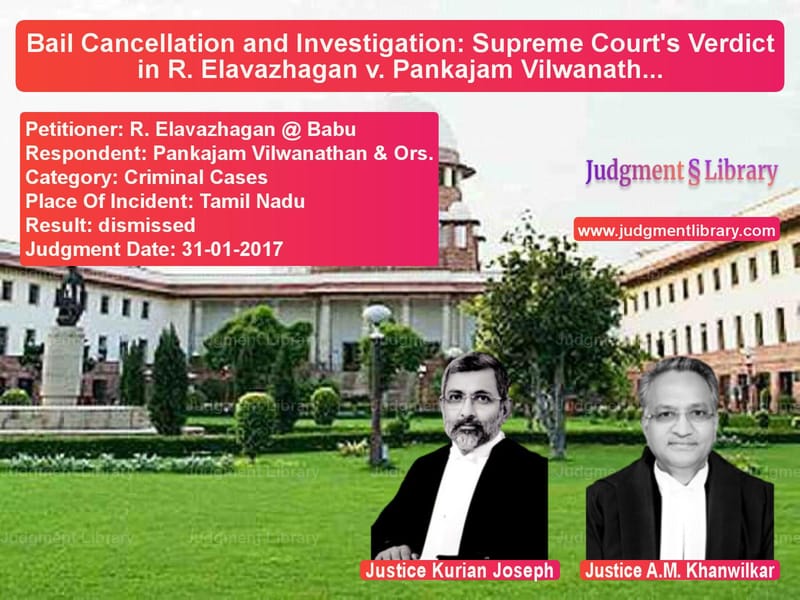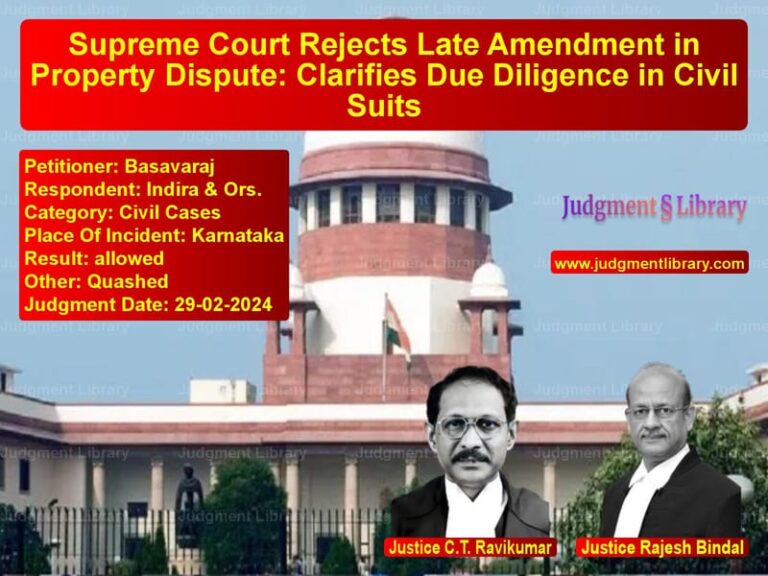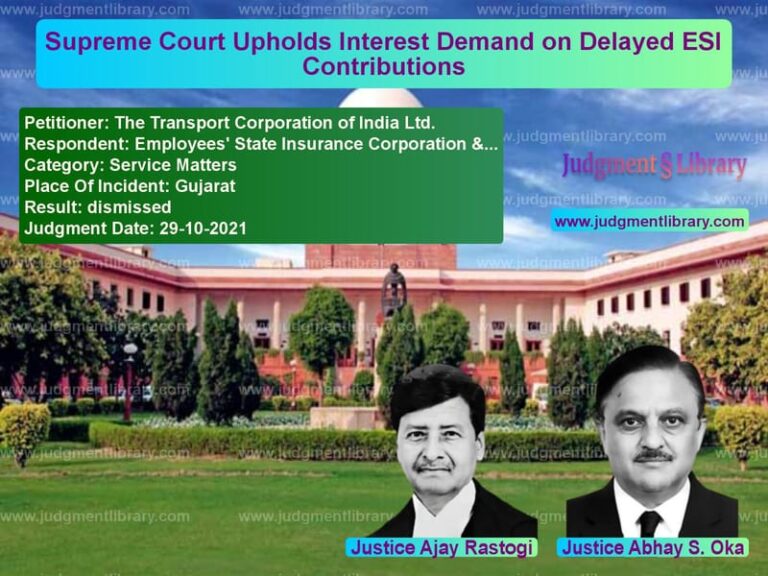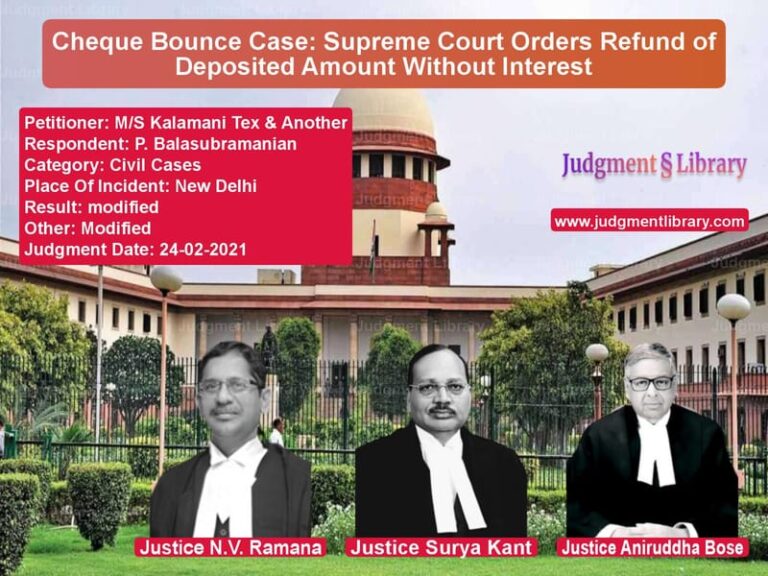Bail Cancellation and Investigation: Supreme Court’s Verdict in R. Elavazhagan v. Pankajam Vilwanathan
Introduction
The case of R. Elavazhagan @ Babu v. Pankajam Vilwanathan & Ors. revolves around the legal principles governing cancellation of anticipatory bail, custodial interrogation, and the scope of further investigation. The Supreme Court addressed whether the High Court was justified in directing the cancellation of anticipatory bail and ordering custodial interrogation of the appellant, who was already on regular bail. The case also underscores the obligations of an accused in cooperating with an ongoing investigation and the consequences of non-cooperation.
Background of the Case
The appellant, R. Elavazhagan, was accused in a criminal case and had secured regular bail. However, the High Court, in its impugned order, directed the cancellation of his anticipatory bail, ordered custodial interrogation, and instructed further investigation. This prompted the appellant to approach the Supreme Court, arguing that these directions were unwarranted and beyond the scope of law.
The case raises significant legal questions regarding the interplay between anticipatory bail, regular bail, and the power of courts to intervene in ongoing investigations.
Legal Issues Raised
- Can a High Court order cancellation of anticipatory bail when the accused is already on regular bail?
- Was the direction for custodial interrogation legally justified?
- Under what circumstances can a court order further investigation after granting bail?
- What are the obligations of an accused in an ongoing criminal investigation?
Arguments by the Appellant (R. Elavazhagan)
- The appellant had already secured regular bail, making the issue of anticipatory bail irrelevant.
- The High Court’s direction for custodial interrogation was excessive, as the appellant had fully cooperated with the investigation.
- The order for further investigation was passed without affording the appellant a fair opportunity to be heard, violating the principles of natural justice.
- The High Court’s decision created uncertainty about the status of the appellant’s liberty despite the fact that he had been granted bail.
Arguments by the Respondents (Pankajam Vilwanathan & Ors.)
- The High Court had sufficient justification to order custodial interrogation based on new evidence.
- The appellant had failed to fully cooperate with the investigation, making custodial interrogation necessary.
- Further investigation was crucial to ensure that justice was served, and the High Court’s order was well within its jurisdiction.
- The prosecution needed additional time to gather more evidence before proceeding to trial.
Supreme Court’s Judgment
The Supreme Court ruled that since the appellant was already on regular bail, the issue of anticipatory bail did not arise. The Court stated:
“It is an undisputed position that the appellant has been on regular bail while the High Court passed the impugned order.”
Regarding the direction for further investigation, the Supreme Court ruled that the appellant could not interfere with the process. The Court stated:
“Nothing survives in this appeal since the appellant cannot, in any way, stall the further investigation, as ordered by the High Court in the impugned order.”
The Supreme Court further clarified:
“The appellant shall cooperate with the investigation, and in case there is non-cooperation on the part of the appellant, it will be open to the Investigating Officer to seek for cancellation of the regular bail.”
With this, the Supreme Court dismissed the appeal and upheld the High Court’s directions.
Analysis of the Judgment
The Supreme Court’s ruling clarifies key aspects of bail jurisprudence:
- Anticipatory Bail vs. Regular Bail: Once an accused is granted regular bail, the issue of anticipatory bail becomes moot.
- Custodial Interrogation: A court may order custodial interrogation if the accused fails to cooperate with the investigation.
- Further Investigation: Courts can direct further investigation to ensure the complete truth is uncovered before trial.
- Obligations of an Accused: A person on bail must fully cooperate with the investigation or risk bail cancellation.
Key Takeaways from the Judgment
- Bail Conditions Are Subject to Compliance: An accused must adhere to bail conditions and assist in the investigation.
- High Courts Have Wide Discretion: Courts can modify bail orders based on evolving circumstances.
- Custodial Interrogation May Be Necessary: In complex cases, authorities may require the accused to be in custody for effective questioning.
- Further Investigation Ensures Fairness: Investigative agencies must be allowed to collect additional evidence if required.
Implications of the Judgment
This ruling has significant implications for criminal law:
- Accused persons cannot use bail as a shield to evade further investigation.
- High Courts have the authority to revise bail conditions if required by the circumstances.
- Failure to cooperate with authorities can lead to bail cancellation.
- Courts must balance the rights of the accused with the need for thorough investigation.
Future Implications for Bail Jurisprudence
The ruling serves as a benchmark for cases involving bail and investigation:
- Bail conditions may be subject to further scrutiny if an accused fails to cooperate.
- Court orders for further investigation should not be seen as punitive but as a means to ensure justice.
- The legal system must ensure that an accused is not granted undue immunity through bail while ensuring their rights are protected.
Conclusion
The Supreme Court’s ruling in R. Elavazhagan v. Pankajam Vilwanathan underscores that bail does not grant an accused immunity from further investigation. The decision reinforces that an accused must cooperate fully with the legal process and that courts have the discretion to modify bail conditions when necessary. This judgment serves as a guiding precedent for balancing individual rights with the needs of justice.
Don’t miss out on the full details! Download the complete judgment in PDF format below and gain valuable insights instantly!
Download Judgment: R. Elavazhagan @ Bab vs Pankajam Vilwanathan Supreme Court of India Judgment Dated 31-01-2017.pdf
Direct Downlaod Judgment: Direct downlaod this Judgment
See all petitions in Bail and Anticipatory Bail
See all petitions in Judgment by Kurian Joseph
See all petitions in Judgment by A M Khanwilkar
See all petitions in dismissed
See all petitions in supreme court of India judgments January 2017
See all petitions in 2017 judgments
See all posts in Criminal Cases Category
See all allowed petitions in Criminal Cases Category
See all Dismissed petitions in Criminal Cases Category
See all partially allowed petitions in Criminal Cases Category







